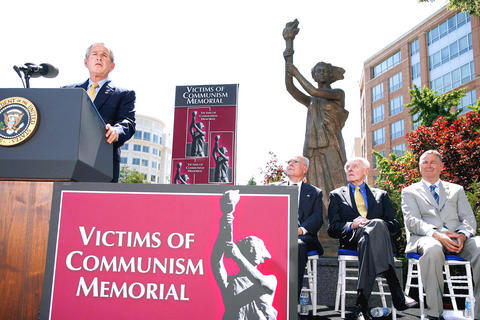US President George W. Bush shook hands and chatted with Representative to the US Joseph Wu (
Wu was among the roughly 1,000 guests invited to the dedication of the Victims of Communism (VOC) Memorial in Washington.
Bush gave a speech during the ceremony and greeted other guests afterwards.

PHOTO: EPA
Wu introduced himself to Bush by saying: "I'm Ambassador Joseph Wu from Taiwan."
Wu also took the opportunity to thank Bush for his support for Taiwan and said Taiwan firmly supports US efforts to spread the ideals of freedom and democracy around the world.
Bush thanked Wu and said: "It's good to see you here," while tapping Wu's chest with his fist.
He then autographed a VOC Memorial dedication pamphlet and gave it to Wu.
Since the US switched diplomatic recognition from Taipei to Beijing in 1979, Taiwan's representative to the US has had few opportunities to chat or shake hands in public with any sitting US president. Tuesday's brief encounter marked the first face-to-face exchange between Bush and Wu.
The VOC Memorial was more than a decade in the making. The US Congress passed an act in 2003 on the establishment of the Victims of Communism Memorial Foundation to raise funds to build the monument in memory of the more than 100 million people killed by communist regimes -- from China and Soviet Union to Cambodia and North Korea.
Taiwan donated money to the foundation in the name of the Taiwan Foundation for Democracy.
When a groundbreaking ceremony was held last September, then-representative to the US David Lee (
Tuesday's dedication ceremony was chaired by Lee Edwards, chairman of the VOC Memorial Foundation; Representative Tom Lantos, chairman of the House Foreign Affairs Committee; and Representative Dana Rohrabacher.
In his speech, Rohrabacher mentioned former US president Ronald Reagan's speech at the Berlin Wall in which he challenged then Soviet leader Mikhail Gorbachev to "tear down this wall."
For his part, Bush said it was time to recall the lessons of the Cold War, namely "that freedom is precious and cannot be taken for granted, that evil is real and must be confronted, and that given the chance, men commanded by harsh and hateful ideologies will commit unspeakable crimes and take the lives of millions."
At the center of the memorial is the figure of a woman holding what Bush called a "lamp of liberty."
"She reminds us that when an ideology kills tens of millions of people and still ends up being vanquished, it is contending with a power greater than death," he said.
Noting that the US was obligated to seek justice for victims of communism, Bush said his administration would continue to promote freedom and democracy in the hope that there will be no more victims of communism.
Wu said that Taiwan, like many other countries, has been a victim of communism and now still faces serious military, security and health threats from communist China.
Because of China's obstruction, Wu said, the health of Taiwan's 23 million people is denied the protection of the WHO.
Taiwan is more than willing to contribute to activities honoring memories and educating current and future generations about communism's crimes against humanity, Wu said.

An essay competition jointly organized by a local writing society and a publisher affiliated with the Chinese Communist Party (CCP) might have contravened the Act Governing Relations Between the People of the Taiwan Area and the Mainland Area (臺灣地區與大陸地區人民關係條例), the Mainland Affairs Council (MAC) said on Thursday. “In this case, the partner organization is clearly an agency under the CCP’s Fujian Provincial Committee,” MAC Deputy Minister and spokesperson Liang Wen-chieh (梁文傑) said at a news briefing in Taipei. “It also involves bringing Taiwanese students to China with all-expenses-paid arrangements to attend award ceremonies and camps,” Liang said. Those two “characteristics” are typically sufficient

A magnitude 5.9 earthquake that struck about 33km off the coast of Hualien City was the "main shock" in a series of quakes in the area, with aftershocks expected over the next three days, the Central Weather Administration (CWA) said yesterday. Prior to the magnitude 5.9 quake shaking most of Taiwan at 6:53pm yesterday, six other earthquakes stronger than a magnitude of 4, starting with a magnitude 5.5 quake at 6:09pm, occurred in the area. CWA Seismological Center Director Wu Chien-fu (吳健富) confirmed that the quakes were all part of the same series and that the magnitude 5.5 temblor was

The brilliant blue waters, thick foliage and bucolic atmosphere on this seemingly idyllic archipelago deep in the Pacific Ocean belie the key role it now plays in a titanic geopolitical struggle. Palau is again on the front line as China, and the US and its allies prepare their forces in an intensifying contest for control over the Asia-Pacific region. The democratic nation of just 17,000 people hosts US-controlled airstrips and soon-to-be-completed radar installations that the US military describes as “critical” to monitoring vast swathes of water and airspace. It is also a key piece of the second island chain, a string of

The Central Weather Administration has issued a heat alert for southeastern Taiwan, warning of temperatures as high as 36°C today, while alerting some coastal areas of strong winds later in the day. Kaohsiung’s Neimen District (內門) and Pingtung County’s Neipu Township (內埔) are under an orange heat alert, which warns of temperatures as high as 36°C for three consecutive days, the CWA said, citing southwest winds. The heat would also extend to Tainan’s Nansi (楠西) and Yujing (玉井) districts, as well as Pingtung’s Gaoshu (高樹), Yanpu (鹽埔) and Majia (瑪家) townships, it said, forecasting highs of up to 36°C in those areas